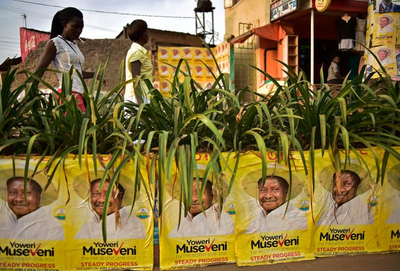
What Does Museveni’s Victory Mean for Uganda?
Yoweri Museveni was re-elected for another five years in Uganda’s recent elections, extending his 30-year mandate in the East African country.
The elections and results were not without controversy. At least one opposition supporter died in the run-up to voting on Thursday, while leading opposition Forum for Democratic Change (FDC) candidate Kizza Besigye was arrested four times in eight days.
The international community has provided a spectrum of responses to the elections, with the U.S. and EU criticizing the vote while Russia and Uganda’s neighbors Kenya and Burundi hailed the re-election of the 71-year-old president. While parliamentary results are not yet finalized, Museveni’s National Resistance Movement (NRM) looks set to retain its dominance in the legislature: The ruling party held 259 of 385 seats prior to the 2016 election, compared to the FDC’s 36.
Newsweek spoke to a panel of Ugandans and academic experts on the significance of the results.
Five more years of suffering for LGBT Ugandans
Frank Mugisha, executive director of Sexual Minorities Uganda, an LGBT NGO based in Kampala.
“This is a very hard situation for the LGBT community because we have a president who has expressed homophobic views in the past and who has openly signed an anti-gay law in the presence of international and local media. [Museveni backed a law introduced in February 2014 that punished certain types of homosexual activity with life imprisonment. The law was overturned by Uganda’s constitutional court in August 2014.]
“During the last five years of his presidency, he has not been able to control the spread of homophobia and abuse of LGBT persons in Uganda. I don’t see that changing in the coming five years.
“He has got huge political opposition right now, which he didn’t have in the past. My worry is that the LGBT community could be used as a scapegoat. Someone, somewhere will have to be blamed for problems the government encounters and my fear is that it could be the LGBT community, because minority groups always suffer such consequences.
“This is a time for us to engage the government and say that LGBT rights are still on the radar.”
Opposition must convert Besigye’s popularity into parliamentary clout
Nic Cheeseman, associate professor in African Politics at the University of Oxford.
“The lesson I took from this last election is that the FDC have done reasonably well in building goodwill among the population in areas you might not have expected. There’s a good basis in that for Besigye to make a very strong campaign next time round.
“The real downside is that it looks as if the FDC will do pretty badly in the parliamentary elections. If you want to see better legislation, better accountability, falling corruption, better economic policy, the challenge for Uganda is to get a more balanced parliament. When you’ve got a ruling party that is winning most of the seats in parliament, it can do what it wants in terms of allowing Museveni to stay as long as he wants and the FDC can’t block it because they’re not really a presence in the legislature.”
Ugandan businesses should brace themselves
Solomon King Benge, social entrepreneur and founder of two tech companies—Node 6 and Elemental Edge—based in Kampala.
“I think the biggest challenge that Uganda faces as a fallout of these elections has little to do with who won. It’s more about the financial and economic implications for the country. A lot of money has been spent to win this election (and to enforce law and order), most of it diverted from critical government areas. [A civil society report found that all candidates and parties spent almost 138 billion Ugandan shillings ($40.5 million) on campaigning between November-December 2015 alone.]
“And if the previous election is anything to go by, all businesses and individuals are bracing themselves for a very rough ride that will see high inflation rates, a rising dollar and weak expenditure across the board, which ultimately will affect all businesses, irrespective of sector.
“What has given me hope is that a lot of people actively participated in the election process, especially people who were previously apathetic to politics. I think we’re going to see more involvement in activism and policy change from more and more people. My hopes, however slim, lie in the belief that the change we want to see will happen not from the top down, but from the bottom up, and that we will see more reforms and transparencies in the governance of our nation.”
“Many of the abuses that we have documented over the years in Uganda were on full display during this election period. While on the day of the polls voters showed persistence despite the long delays, the excessive use of force and tear gassing of opposition supporters in the lead up to the election, as well as abusive interference with freedom of expression—whether of the media, candidates, or the electorate—were all present. Read More (What Museveni’s Victory Mean for Uganda – Newsweek.com)
